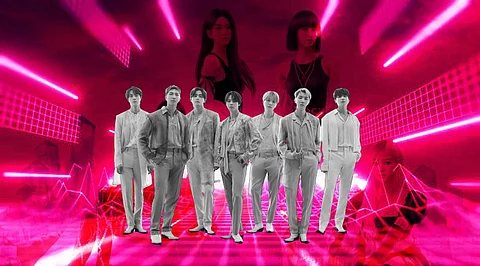
- Insights
- Cryptocurrencies
- Stocks
- White Papers
- Industry
- Geography
- Insights
- Cryptocurrencies
- Stocks
- White Papers
- Industry
- Geography


K-pop has become a truly global phenomenon, thanks to its distinctive blend of addictive melodies, slick choreography, production values, and an endless parade of attractive South Korean performers who spend years in grueling studio systems learning to sing and dance in synchronized perfection. But what does the K-pop industry has to do with Metaverse? Well in the last 2 years of the pandemic many industries saw drastic technological advancements including K-pop, with numerous new ventures for K-pop companies, especially online concerts, and virtual fan engagement events. How Asia's K-pop idols are becoming a gateway to the Metaverse?
Despite its turbulent reputation, celebrities across the landmass are beginning to recognize how Web3 could become a driving force behind the bolstering of their digital presence and leverage idol-to-fan dynamics. It's a burgeoning affair, but one that delivers a lot of potentials to expand to new heights — only recently did girl group Blackpink take the win for Best Metaverse Performance at the MTV Music awards after their "The Virtual" concert via PUBG Mobile, with BTS' Minecraft production coming up a close second.
Not just events but debates and polls related to famous K-pop band "BTS" are also getting held in the metaverse. South Korea's Cytown Metaverse is holding a virtual poll and discussion on the topic of giving the members of K-pop mega group BTS a special exemption from the country's mandatory military service. Cytown opened a public poll on the topic in Cy-agora, the virtual forum on the metaverse platform on Wednesday. The poll will last until September 22. 52.78% of participants were in favor of giving the special exemption to BTS, while 47.22% were against the idea as of 1 p.m. in South Korea on Wednesday.
An increasing number of K-pop acts have jumped into the metaverse, a shared virtual world where people can interact with others via avatars, creating virtual spaces to build stronger and closer connections with their fans. Girl group Billlie met their fans on local telecommunication carrier SK Telecom's metaverse platform island a few days ago. The latest event is part of the girl group's effort to expand its presence in a three-dimensional virtual space. Let's find out how the K-pop metaverse will change the entertainment landscape.
According to a report published by iResearch Consulting Group in 2020, the market value related to the fan economy in China was estimated to be more than $619.2 billion (4 trillion RMB) in 2019 and was projected to surpass $861.7 billion (6 trillion RMB) in 2023. Meanwhile, South Korea's K-pop industry has seen fans spending more on concerts, merchandise, and products related to their musical icons.
The K-pop industry is known for its cutting-edge technology, including the metaverse. Especially during the pandemic, digital technology has helped people stay connected. This also applies to the entertainment industry, as offline concerts are put on hold. Metaverse, with its virtual reality aspect, has become one of the possible answers to reconnect artists with fans–albeit through the digital world.
In terms of metaverse application, there is a growing number of metaverse-related projects/groups in K-pop. One of the famous examples is the group Vespa, which was introduced as a group with virtual counterparts (ae). Alongside the real members, asepa consists of 4 virtual avatars representing the members. It has since become a central aspect from which aespa's concept was derived.
Businesses and parts of the South Korean government are looking at creating metaverses; this summer saw banks in South Korea invest in metaverse asset funds and the country's Ministry of Science and ICT earmarks trillions of won to foster tech ventures including metaverses. Millions of South Koreans invested in digital land grabs in metaverses. In early November, the Seoul city government also announced plans for its metaverse elements.
A mainstay of K-pop's push into metaverses is the growth of virtual performances and performers, which may seem like a new thing but dates back nearly two decades: a cyber-singer known as Adam was created and released the album, 'No Love Like This' in 1998. Numerous other digital performers have popped up in recent years, such as the popular League of Legends tie-in girl group K/DA, which is voiced by a variety of pop artists including K-pop stars, and this year's virtual girl group Eternity.
In March, Blackpink's virtual avatars held a fan event on the avatar-based social media network, and 46 million users reportedly attended the event to receive digital autographs from the group. The following month, SK Telecom launched its "K-pop Metaverse Project" on its augmented reality app Jump AR, which enabled fans to create their music videos based on girl group Weeekly's music and dances. The group also hosted a virtual "face-to-face" event in May.
In September 2021, the South Korean Ministry of Science and ICT announced plans to invest a whopping US$7.5 billion into digital technologies by the year 2025; 9% ($2.2 billion) of which will go to "metaverse-related" technologies. According to a report by London-based analytics and consulting company GlobalData, the country will use part of this funding to develop its own K-pop metaverse.
According to the Ministry of Science and ICT, the country plans on developing 220 metaverse firms supported by 40,000 industry experts by the year 2026. This would position the country as the fifth largest metaverse market in the world.
